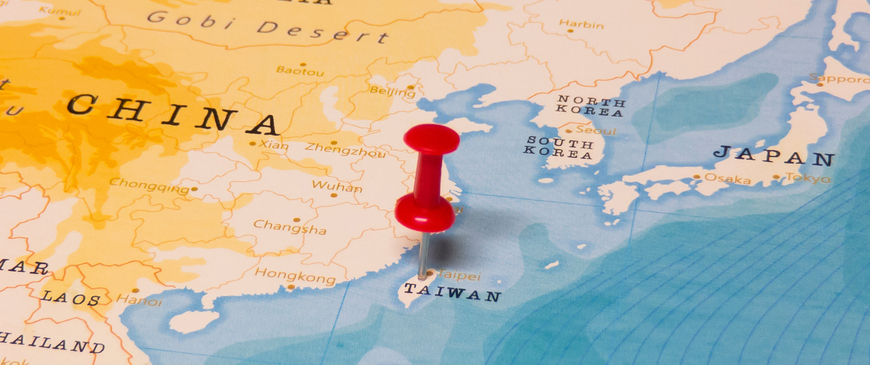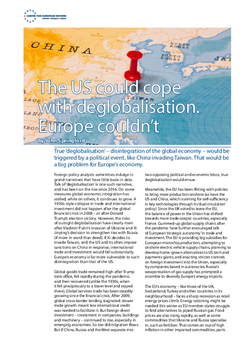
The US could cope with deglobalisation. Europe couldn't
True ‘deglobalisation’ – disintegration of the global economy – would be triggered by a political event, like China invading Taiwan. That would be a big problem for Europe’s economy.
Foreign policy analysts sometimes indulge in grand narratives that have little basis in data. Talk of ‘deglobalisation’ is one such narrative, and has been on the rise since 2016. On some measures global economic integration has stalled, while on others, it continues to grow. A 1930s-style collapse in trade and international investment did not happen after the global financial crisis in 2008 – or after Donald Trump’s election victory. However, the risks of outright deglobalisation have clearly risen after Vladimir Putin’s invasion of Ukraine and Xi Jinping’s decision to strengthen ties with Russia (if more in word than deed). If Xi decides to invade Taiwan, and the US and its allies impose sanctions on China in response, international trade and investment would fall substantially. Europe’s economy is far more vulnerable to such disintegration than that of the US.
Global goods trade remained high after Trump took office, fell rapidly during the pandemic, and then recovered (unlike the 1930s, when it fell precipitously to a lower level and stayed there). Global services trade has been steadily growing since the financial crisis. After 2009, global cross-border lending stagnated: slower trade growth meant less international credit was needed to facilitate it. But foreign direct investment – investment in companies, buildings and machinery – continued to rise, especially in emerging economies. So too did migration flows. But if China, Russia and the West separate into two opposing political and economic blocs, true deglobalisation would ensue.
Meanwhile, the EU has been flirting with policies to bring more production onshore (as have the US and China, which is aiming for self-sufficiency in key technologies through its ‘dual circulation’ policy). Since the UK voted to leave the EU, the balance of power in the Union has shifted towards more trade-sceptic countries, especially France. Gummed-up global supply chains after the pandemic have further encouraged talk of European ‘strategic autonomy’ in trade and investment. The EU is providing big subsidies for European microchip production, attempting to onshore electric vehicle supply chains, planning to develop home-grown alternatives to US tech and payments giants, and enacting stricter controls on foreign investment into the Union, especially by companies based in autocracies. Russia’s weaponisation of gas supply has prompted a scramble to diversify Europe’s energy imports.
The EU’s economy – like those of the UK, Switzerland, Turkey and other countries in its neighbourhood – faces a sharp recession as retail energy prices climb. Energy rationing might be needed this winter as EU member-states struggle to find alternatives to piped Russian gas. Food prices are also rising rapidly, as well as some commodities that Ukraine and Russia specialise in, such as fertiliser. That comes on top of high inflation in other imported commodities, parts and finished goods, thanks to pandemic-induced supply chain disruption.
The current energy crisis shows how future trade shocks would play out: first, they lead to higher prices, which then reduce demand and thus economic activity. Inflation encourages investment in domestic production and substitutes, if they can be found. But domestic production and substitutes are less efficient, or they would have been delivered by market forces anyway. That means domestic consumers face continued higher prices for the same goods, forcing them to either reduce their consumption of those goods or cut spending on other things.
The US has suffered from a similar overall inflation rate to the EU (even if inflation took off earlier in America). But it is more self-sufficient in energy, with larger oil and gas stocks. It also has more than twice as much agricultural land as the EU (360 million hectares versus 174 million). At the time of writing, the consensus forecast was a milder recession this year than in Europe.
The US’s economy is more robust in the face of deglobalisation in other ways, too. Its top imports are similar to those of the EU – computers, microchips, electrical machinery, oil and refined petroleum, pharmaceuticals, medical devices and metals. But it has larger computing and chip companies than the EU, allowing it to raise domestic production more rapidly if need be. The EU’s large manufacturing sector, and its greater reliance on Asia for inputs, makes it more vulnerable to conflict there.
More ‘strategic autonomy’ in microchips, medical equipment, electric vehicles and digital tech would impose costs on European consumers, but without the environmental benefits that energy independence would bring. Cutting imports of hydrocarbons from Russia will make the EU less vulnerable to blackmail by Putin – and cutting fossil fuel imports more generally will allow a more robust approach to oil and gas exporters, which are mostly autocracies. There are green substitutes for fossil fuel energy, especially in electricity generation and transport, and higher fossil fuel prices will prompt more investment and research and development in earlier-stage technology. Higher energy prices are a good thing, insofar as they price in the costs that fossil fuels impose on society. But the production and consumption of microchips, medical equipment and so forth impose far fewer costs on society than energy does, and governments should seek to keep prices of these goods as low as possible.
That is not to say that governments should ignore dependence on one country for supplies of important goods. Both Europe and the US are vulnerable to a Chinese invasion of Taiwan, because such a large share of advanced microchips are made there. China’s dominance in the processing of metals needed for battery production is also a problem. But Europe’s strategy should be first to diversify production, especially to companies based in countries that face fewer political risks, and resist the temptation to prioritise onshoring production.
Market forces have an important role to play in dealing with political risks and disruptions. Those who argue, with some reason, that companies are bad at pricing political risks must also explain why governments are better at it. Onshoring imposes large costs on consumers (and taxpayers, if it is subsidised). Those costs may be larger than the supposed benefits of resilience, especially if onshoring substantially raises prices. And the costs of disruption may not be as large as governments assume: supply chains held up reasonably well through the pandemic, considering the huge impact lockdowns and infection had on global production capacity. During the worst of the pandemic, domestic production facilities were just as likely to be closed as foreign ones (although governments could do more to keep their own critical facilities running).
In some sectors, such as food, energy, pharmaceuticals and medical equipment, governments should regulate and stockpile to ensure resilient supply. The case is far weaker for less critical goods and services and the EU should do more to resist lobbying for onshoring subsidies than it has so far, leaving manufacturers to seek low-cost suppliers outside China or build their own plants, if they can do so competitively.
Trade and investment policy can help, however. Countries that could help reduce political risks, because they are endowed with commodities, workers or capital, and are unlikely to become enemies, should be first in line in negotiations. North African countries have enormous solar energy potential, which could be connected to the European grid. Many Latin American countries and India are relatively stable, have plenty of commodities or cheap labour, and keen to balance China and the West against one another.
If China invades Taiwan, prompting an economic rupture with the West, the economic consequences would be painful for the US, but worse for Europe. The EU should dial back the more mercantilist elements of its ‘strategic autonomy’ plans: becoming resilient to globalisation's political risks means taking advantage of its benefits while curbing the downsides – not retreating from it altogether.
John Springford is deputy director of the Centre for European Reform.

